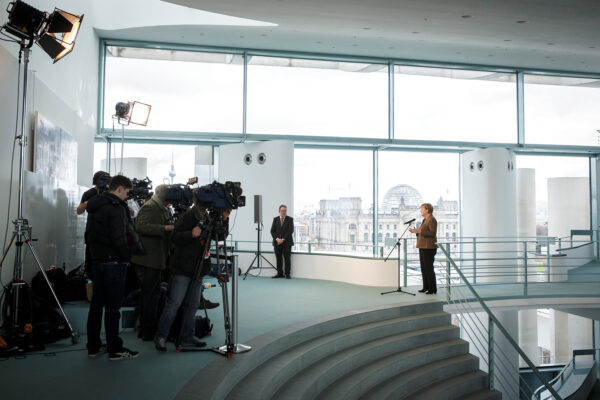
German chancellor Angela Merkel has announced she will not seek reelection as leader of her Christian Democratic Union (CDU) in December in the wake of disappointing state election results in Bavaria and Hessen.
How will this affect the remainder of her chancellorship? Who could replace her? And what, if anything, does it mean for Europe?
End of an era
The end of the Merkel era is now in sight.
Open Europe’s Leopold Traugott argues that Merkel’s willingness to hand over the reins over her party without simultaneously vacating the chancellery is a sign of how strong pressure on her had become:
Over the past years, she had consistently and publicly ruled out remaining on as chancellor without holding party leadership, criticizing the weak position it would put her in.
Traugott points out that Merkel already lost control in September, when her ally, Volker Kauder, lost a secret ballot for the leadership of the parliamentary CDU.
Matthew Karnitschnig argues in Politico that her resignation injects further instability into German politics, increasing the likelihood that the grand coalition with the Social Democrats (SPD), already hanging by a thread, will collapse in the coming months.
What’s more, it now appears inevitable that the race to succeed her atop the CDU will unleash a bitter battle over its direction, one that will further distract the party from governing.
Who could replace her?
There are three candidates so far:
- Annegret Kramp-Karrenbauer, the former prime minister of Saarland and current CDU secretary general. Merkel sees Kramp-Karrenbauer as the best candidate to defend her legacy: modernizing the CDU and making it electable to young people, women and urban voters. The Financial Times reports that conservatives praise her outspokenness on family values and the left wing of the CDU appreciates her support for the minimum wage and workers’ rights. Working against her is that internal pressure for a clean break with the Merkel era after eighteen years may prove too great.
- Friedrich Merz, a longtime Merkel rival with strong support among CDU traditionalists. The problem is that he doesn’t sit in the Bundestag anymore, which could make it more difficult for him to use the party leadership as a springboard to the chancellery.
- Jens Spahn, the health minister and another Merkel critic. He appeals to conservative who accuse Merkel of creating space on the right for the Alternative for Germany by letting in more than one million refugees in 2015-16. His weakness, according to Traugott, is that he is seen by many as too young and inexperienced to take on the leadership yet.
Another argument in Kramp-Karrenbauer’s favor, according to Karnitschnig, is geography:
Both Merz and Spahn are from North Rhine-Westphalia, Germany’s most populous state. Trouble is, Ralph Brinkhaus, the new head of the parliamentary group, also hails from the state. A party leader from the state would upend the balance the party has traditionally sought to maintain between the regions.
If Merz or Spahn were nevertheless to prevail, it would be hard for Merkel to serve out her term as chancellor until 2021. Wolfgang Schäuble, the Bundestag president and former finance minister, could take over as interim chancellor.
What does it mean for Europe?
I’ve argued in the past that Europe’s stability doesn’t hinge on any one person and the Brookings Institution’s James Kirchick agrees:
Visions of the German chancellor as the only person standing between humanity and the apocalypse became fashionable after […] Donald Trump’s election to the White House. But they were always overblown. Merkel herself knows that Germany — with its poorly-equipped military, deeply ingrained pacifism and historical hangups — is in no position to defend the West.
But Merkel did play a major role in the euro crisis and both Traugott and Tony Barber argue that her departure makes it less likely the EU will undertake bold reforms. French president Emmanuel Macron, who has introduced proposals to accelerate the EU’s integration make it work for the little guy, may need to find another ally.
Leonid Bershidsky takes the opposite view, arguing in Bloomberg View that a lame-duck Merkel, freed from the need to placate her conservative allies and egged on by Kramp-Karrenbauer and the SPD, could move faster and more decisively on the European Union’s post-Brexit consolidation, including a common immigration agenda and a tighter financial union; on conflict resolution in Syria, Ukraine and the Balkans; on building up the EU as a sober counterweight to President Donald Trump’s America; and on domestic infrastructure investment and fixing the pension system.
What does it mean for Brexit?
Nothing. You can devote 600 words to this question, like the Financial Times, but the bottom line — as they know — is that, with or without Merkel, “there is simply no room in the German vision for the sort of pick-and-choose approach to EU arrangements favored by Theresa May.”
